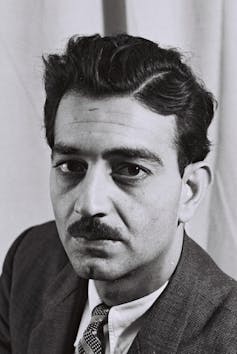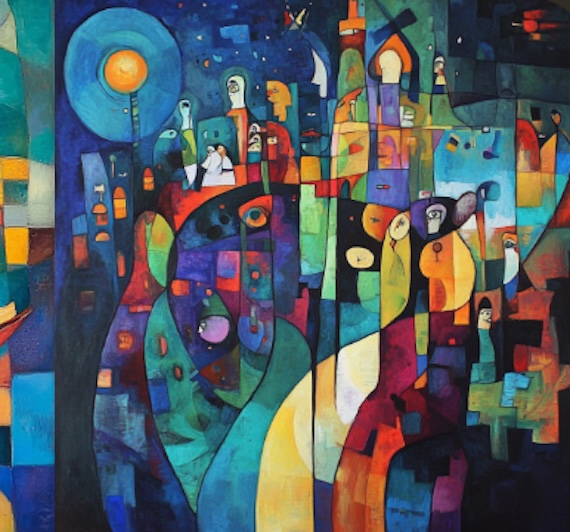By Heather Laird, University College Cork
(The Conversation) – Palestinian literature is unique. It stands apart for its ability to capture a nation’s identity in exile – shaped not by borders, but by memory, resistance and longing.
The settings of modern Palestinian literature include Israel, the occupied territories, countries more broadly in the Middle East, and locations further afield. Four notable writers are particularly worth exploring: Emile Habibi, Ghassan Kanafani (now both dead) and more recent authors, Isabella Hammad and Anwar Hamed.

Théodore Brauner / Wikipedia, CC BY
Emile Habibi (1922-96) was one of about 150,000 Palestinian Arabs who remained in the territory that became Israel in 1948. He started writing in his mid-40s in response to a claim by an Israeli politician that Palestinians no longer existed in Israel, because if they did, they would have their own literature.
In his novel, The Secret Life of Saeed: The Pessoptimist (1974), the central character flees to Lebanon in 1948, but soon afterwards is allowed to return home on the understanding that he will become an informant for Israeli intelligence. Despite his cooperation with the state of Israel, Saeed is beaten and imprisoned, finally learning from a fellow prisoner that his Palestinian identity is worthy of respect.
Ghassan Kanafani (1936-72) was one of approximately 750,000 Palestinians who were expelled from or fled Mandatory Palestine in 1948. A political thinker, journalist and revolutionary, his writings documented the horrors of war and occupation, and include Men in the Sun (1962), a short novel that features three Palestinian men who have been living for ten years in refugee camps in Iraq and are now attempting a dangerous desert journey to Kuwait.
Isabella Hammad (1992-) was born in London and raised by a British-Irish mother and a Palestinian father. Unlike Habibi and Kanafini, whose literary works were published initially in Arabic, Hammad writes in English. Her 2024 novel, Enter Ghost, imagines a production of Shakespeare’s Hamlet in the West Bank. Its central character is a London-based actress who grew up in Israel as a Palestinian Arab and becomes involved in the Hamlet production while visiting her sister in Israel.
Though featuring disparate settings, Palestinian literature is linked by recurring motifs. Olive trees and keys, in particular, hold resonance in Palestinian culture. Many Palestinians kept the keys to their houses when they fled or were forced from Mandatory Palestine in 1948. These keys became symbols of loss of home and hope of return.
Palestinian identification with olive trees is grounded in the economic importance of olives for generations of Palestinian farmers. In the context of exile, the olive tree is emblematic of a long-standing connection to the land, adding specificity to a more generalised yearning for home.

In Kanafani’s Men in the Sun, the oldest Palestinian refugee reminisces about the olive trees he once owned, with his current lack of income leaving him no option but to set out on the hazardous journey to Kuwait where Palestinians are finding work as labourers in the oil fields.
The haunting of the present by the past is another common concern of Palestinian literature. In Habibi’s The Pessoptimist, the protagonist is confronted by “ghost-like” figures who ask if he has met anyone from their razed villages while journeying to Israel. This prompts him to reflect on his encounter with a woman attempting to return home and on the military governor who subsequently re-banished her and then watched in surprise as she grew bigger rather than smaller while walking away.
Another of Habibi’s literary works, a short story titled The Odds-and-Ends Woman (1968), mentions the “roving spirits” who, after an absence of 20 years, are making the journey from “the Gaza Strip, the West Bank, Amman, even as far as Kuwait” to Israel in the hope of briefly seeing their former homes. In Hammad’s Enter Ghost, Palestinian characters discuss at length the relevance of Hamlet’s dead father to Shakespeare’s play.
Many works of Palestinian literature employ a serious tone when providing insight into the harsh realities of life for post-1948 Palestinians. Kanafani’s Men in the Sun, for example, is notable for its gritty naturalistic descriptions.
But Palestinian literature is more varied in tone and genre than might be expected. It also includes writings, such as Habibi’s The Pessoptimist, that employ humour to explore the circumstances of post-1948 Palestinians. And, more recently, Anwar Hamed (1957-) has applied a science-fiction sensibility to established motifs in Palestinian literature.
Hamed’s short story, The Key (2019), is set in 2048 in an Israel protected by a high-tech “gravity wall” – an invisible barrier that is programmed to allow only those who have the “key” embedded in their microchips to enter and exit.
The central character is an Israeli whose grandfather collected pictures of exiled Palestinians “clutching rusty keys to houses that no longer existed”. These photographs scared him “more than any arms deal being signed by neighbouring countries”, given the persistent “stubbornness” they revealed. The gravity wall has been designed for security purposes, but also to consign those rusty keys to the past.
But while this wall seems impenetrable, the boundary between past and present is porous. The story’s central character lives a comfortable existence cushioned from “the chaos” beyond the wall. But then the ghostly sound of a key turning in the lock of his apartment door starts to wake him up at night.
The first indication in the story that all Israelis are similarly affected is when the central character is informed that his doctor is inundated with requests for sleep medication. Unable to get an appointment, he decides to pay the doctor a visit outside of work hours.
The story ends with the doctor blowing a hole in his own apartment door with his old service rifle, and possibly killing the central character in the process. The doctor’s irrational reasoning is that with no lock left for an intruder to insert a key, he can finally sleep.
There are many reasons to read Palestinian literature. But chiefly, in innovative fictional ways, it gives voice to the challenging experience of belonging to a nation in exile.
These writings are also a reminder that injustices, if left unaddressed, refuse to be consigned to the past.![]()
Heather Laird, Senior Lecturer in the School of English and Digital Humanities, University College Cork
This article is republished from The Conversation under a Creative Commons license. Read the original article.


 © 2025 All Rights Reserved
© 2025 All Rights Reserved